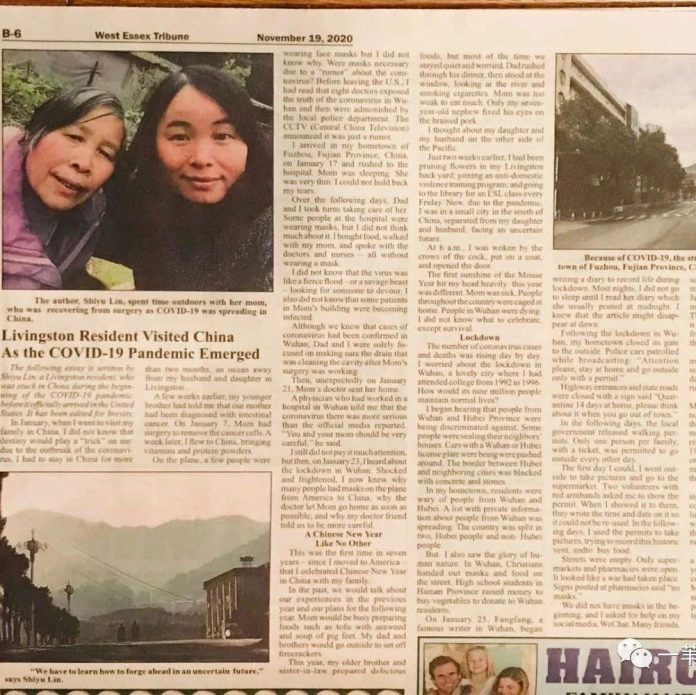编者按:2020年1月15日,我回国探望生病的母亲,不期与疫情撞个满怀,滞留国内两个多月后,3月21日才艰难返美。我把自己的故事译成英文,于11月19日发表在新泽西英文报纸《West Essex Tribune》。让我感动的是,一些读者通过编辑部找到了我的email,告诉我他们的挣扎。一句话:谁都不容易,珍惜活着的每一天吧。(林世钰)
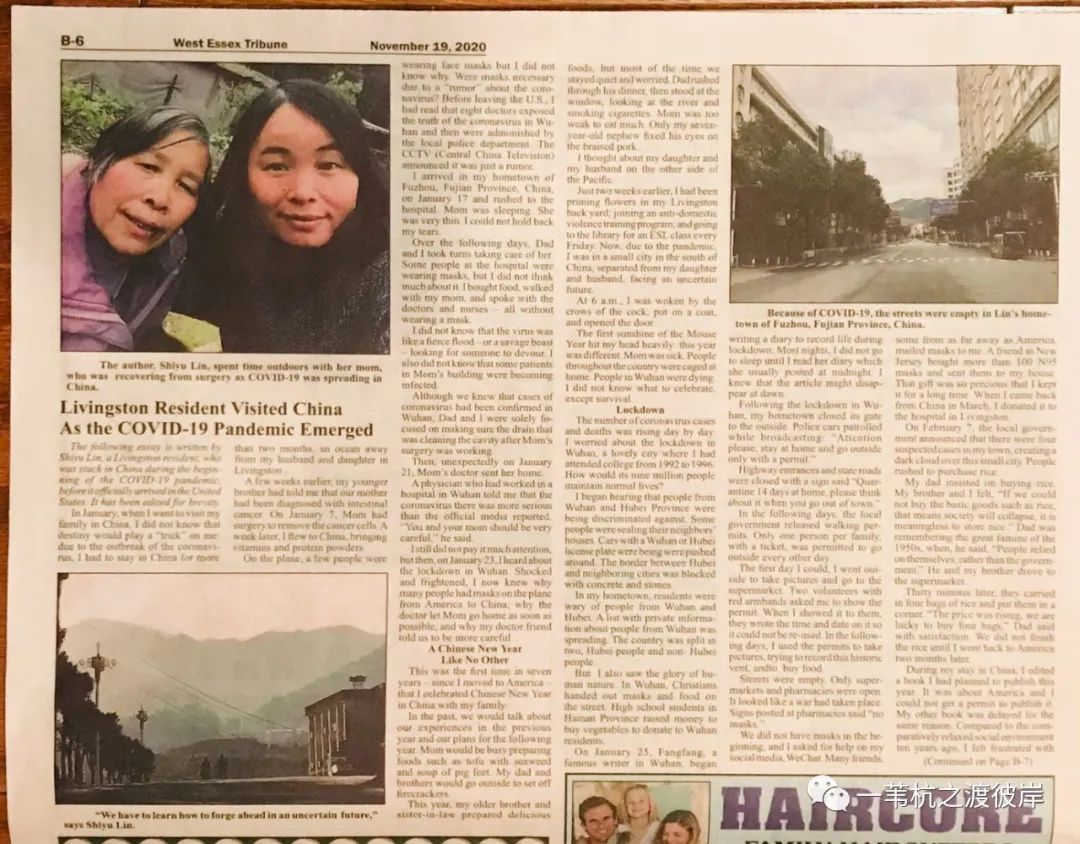
1. Bid Farewell
It was 5:30 a.m. in March in Fuzhou, Fujian Province, China. Few cars were on theroad. In a small restaurant, the shopkeeper was putting out hot soymilks and steaming buns. I was with my dad, whose face looked sad. He said calmly, “Go back to America in peace, I will take goodcare of your mom.”
I held back my tears and asked him which soymilk hepreferred. On the way to the hospital, we were silent, afraid to puncture the mist of sadness if we opened up.
A little later, my younger brother, Jinqiang, drove me to the airport. I couldn’t look back, because my mom was in the hospital to get chemotherapy for her intestinal cancer. And I couldn’t look ahead, because my husband and daughter were becoming stuck in the coronavirus pandemic in Livingston, New Jersey.
2. Seeing Mom in China
In January, when I went to visit my family in China,I did not know that destiny would play a “trick” on me: due to the outbreak of the Coronavirus, I had to stay in China for more than two months.
A few weeks earlier, my younger brother, Jinqiang, had told me that our mother had been diagnosed with intestinal cancer. The blue sky looked broken, like a piece of split silk, and I felt that my childhood was finally over.
On January 7, Mom had surgery to remove the cancer cells. A video shows her lying in bed, with a pale face and unkempt hair. Aweek later, I flew to China, bringing vitamins and protein powders.
On the plane, a few people wore face masks but I did not know why. Were masks necessary dueto a “rumor” about the Coronavirus? Before leaving the U.S., I had read that eight doctors exposed the truth of the Coronavirus in Wuhan and then were admonished by the local police department. The CCTV (Central China Television) announced it was just a rumor.
I arrived in Fuzhou on January 17 and rushed to the hospital. My Mom was sleeping, with knitted brows, very thin, looking like ahedgehog. I could not hold back my tears.
Over the following days, Dad and I took turns taking care of her. Some people at the hospital were wearing masks, but I did not think much about it. I bought food, walked with my mom, and spoke with the doctors and nurses without wearing a mask.
I did not know was that the virus was like a fierce flood – or perhaps a savage beast – looking for someone to devour. I did not know that some patients in the building Mom was in were becoming infected.
Although we knew that cases of Coronavirus had been confirmed in Wuhan, Dad and I were solely focused on making sure the drain that was cleaning the cavity after mom’s surgery was working.
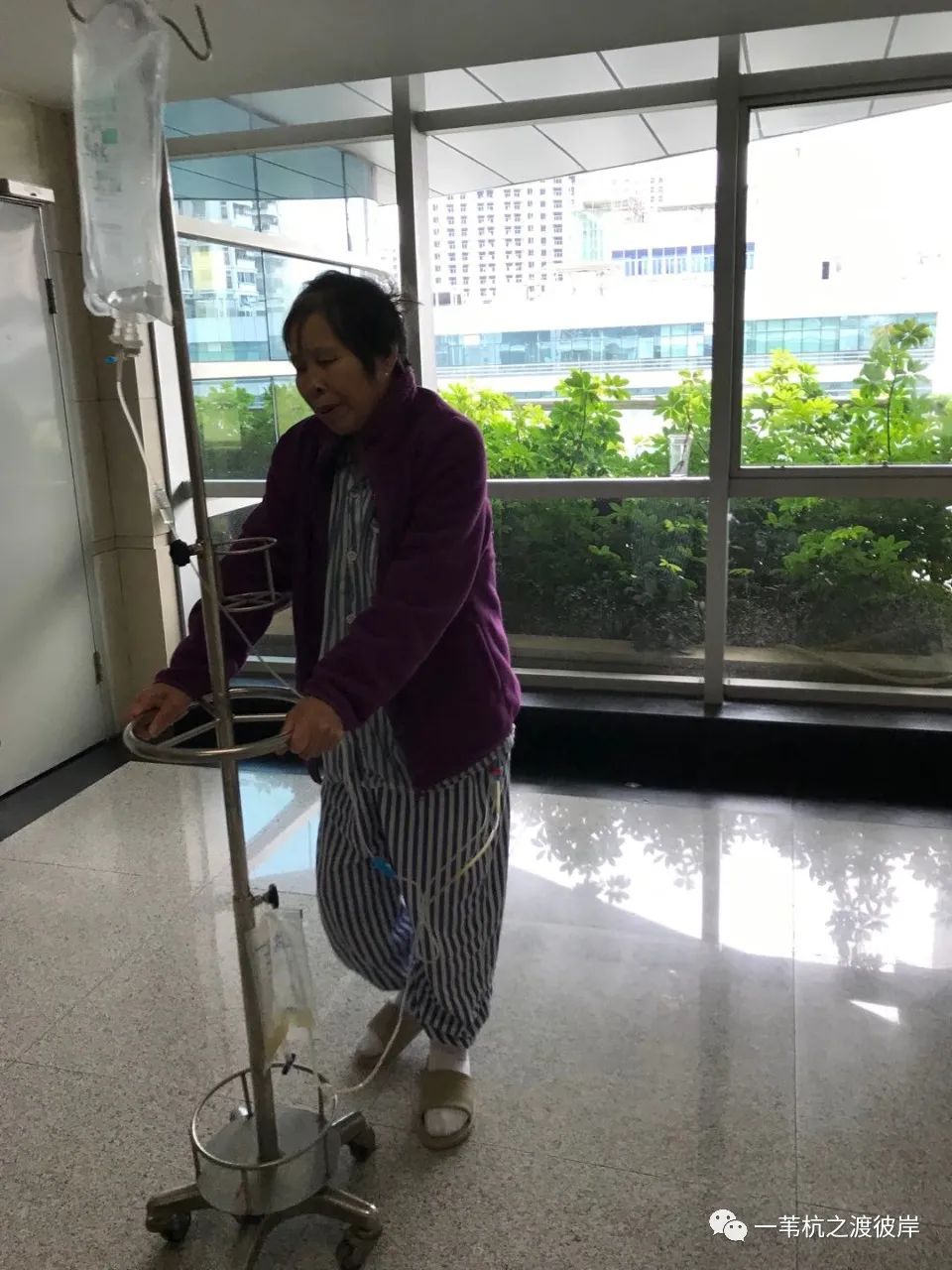
住院的母亲(Mom in Hospital)
Unexpectedly, on January 21, mom’s doctor suggested her to go home.
A physician who had worked in a hospital in Wuhan told me that the Coronavirus there was more serious than the official media reported. “You and your mom should be very careful,” he said. I still did not pay it much attention.
But on January 23, I heard about the lockdown in Wuhan. Shocked and frightened, I now knew why so many people had masks on the plane from America to China; why the doctor let Mom go home as soon as possible; and why my doctor friend told us to be more careful.
I had to stay in China for more than two months, anocean away from my husband and daughter in Livingston. That is how destiny changed our lives.
3. A Chinese New Year Like No Other
This was the first time in seven years – since I moved to America – that I celebrated Chinese New Year in China with my family. In the past, we would sit by the stove and talk about our experiences in the previous year, and our plans for the following year. Mom would be busy in the kitchen, preparing foods such as tofu with seaweed and soup of pig feet. My dad and brothers would go outside to set off firecrackers.
This year, my brother and sister-in-law prepared delicious foods for us, but most of the time we were quiet and worried. My dad rushed through his dinner, then stood at the window, looking at the river and smoking one cigarette after another. Mom was too weak to eat much. Only my 7-year-old nephew fixed his eyes on the braised pork. The unhappy evening reminded me of Van Gogh’s painting, “Potato Eaters.”
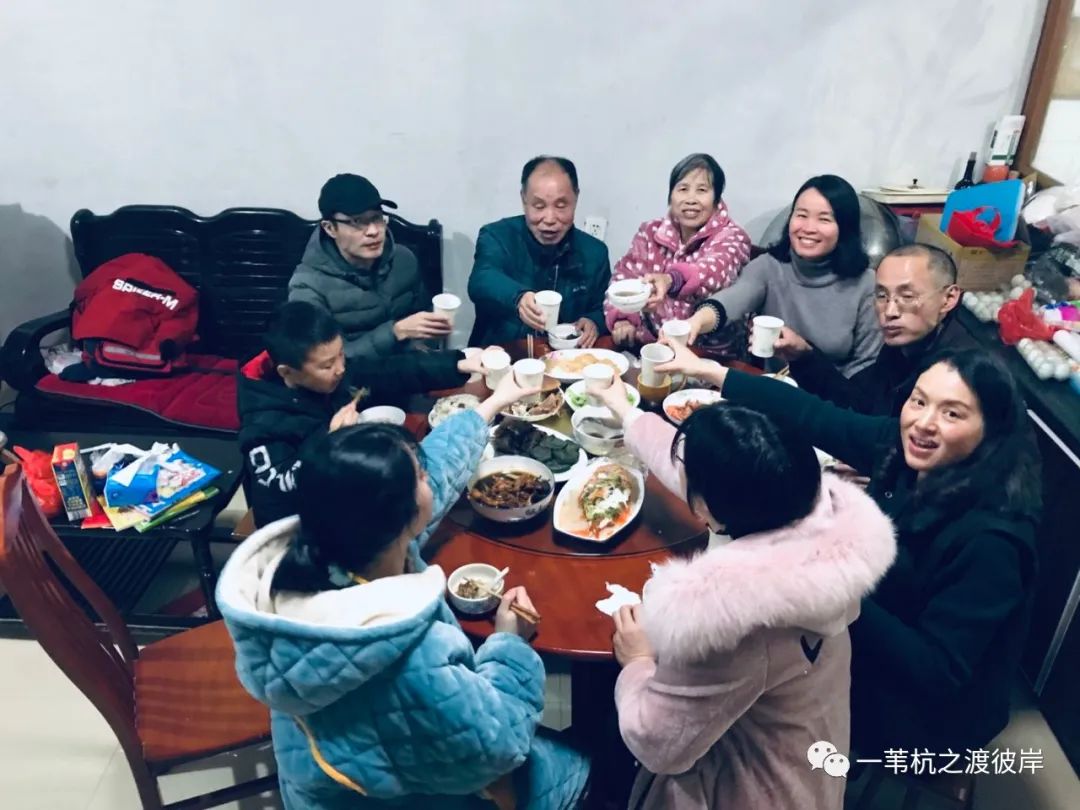
除夕夜(Eve of Lunar New Year )。
After dinner I thought about my daughter and my husband on the other side of the Pacific. Just two weeks earlier, I had been pruning flowers in my suburban backyard, joining an anti-domestic violence training program, and going to the library for an ESL class every Friday. Now, due tothe virus pandemic, I was stuck in a small city in the south of China, separated from my daughter and husband, facing an uncertain future.
At 6 a.m., I was woken by the crows of the cock downstairs, put on a coat and opened the door. The first sunshine of the Mouse Year hit my head heavily. This year was different. Mom was sick. People throughout the country were caged at home. People in Wuha were dying. I did not know what to celebrate, except survival.
4. Lockdown
The number of coronavirus cases and deaths wasrising day by day. I worried about the lockdown in Wuhan, a lovely city where I had attended college from 1992 to 1996. I remembered white sails dancing on the Yangtze River, snow-like cherry trees on the Luojia Mountain, and fragrant grass by the Nanhu Lake. Many of my classmates stayed on in Wuhan after graduation.
How would nine million people in a city maintain normal lives?
I started to hear that people from Wuhan and Hubei Province were being discriminated against. Some people were sealing their neighbors’ houses. Cars with a Wuhan or Hubei license plate were being were pushed around. The border between Hubei and neighboring cities was blocked with concrete and stones.
In my hometown, residents were wary of people from Wuhan and Hubei. A list with private information about people from Wuhan was spreading. The country was split in two, Hubei people and non- Hubei people.
Some hotels posted signs that read: “If you find people from Wuhan, please notify the local government.” My brother told me that his friend’s family from Hubei were wandering for a long time, and could not find a hotel to accept them. At last, they arrived in Guangdong and secretly rented an apartment with his mother-in-law’s ID.
In the disaster, I also saw the glory of human nature. In Wuhan, Christians handed out masks and food on the street. High school students in Hainan Province raised money to buy vegetables to donate to Wuhan residents.
On January 25, Fangfang, a famous writer in Wuhan, began writing a diary to record life during lockdown. Most nights, I did not go to sleep until I read her diary which she usually posted at midnight. I knew that the article might disappear at dawn.
Following the lockdown in Wuhan, my hometown closed its gate to the outside. A dozen police cars patrolled while broadcasting: “Attention please, stay at home and go outside only with the permit.” Highway entrances and state roads were closed with a sign said “Quarantine 14 days at home, please think it about when you go out of town.”
In the following days, the local government released walking permits. One person per family, with a ticket, was permitted to go outside every other day.
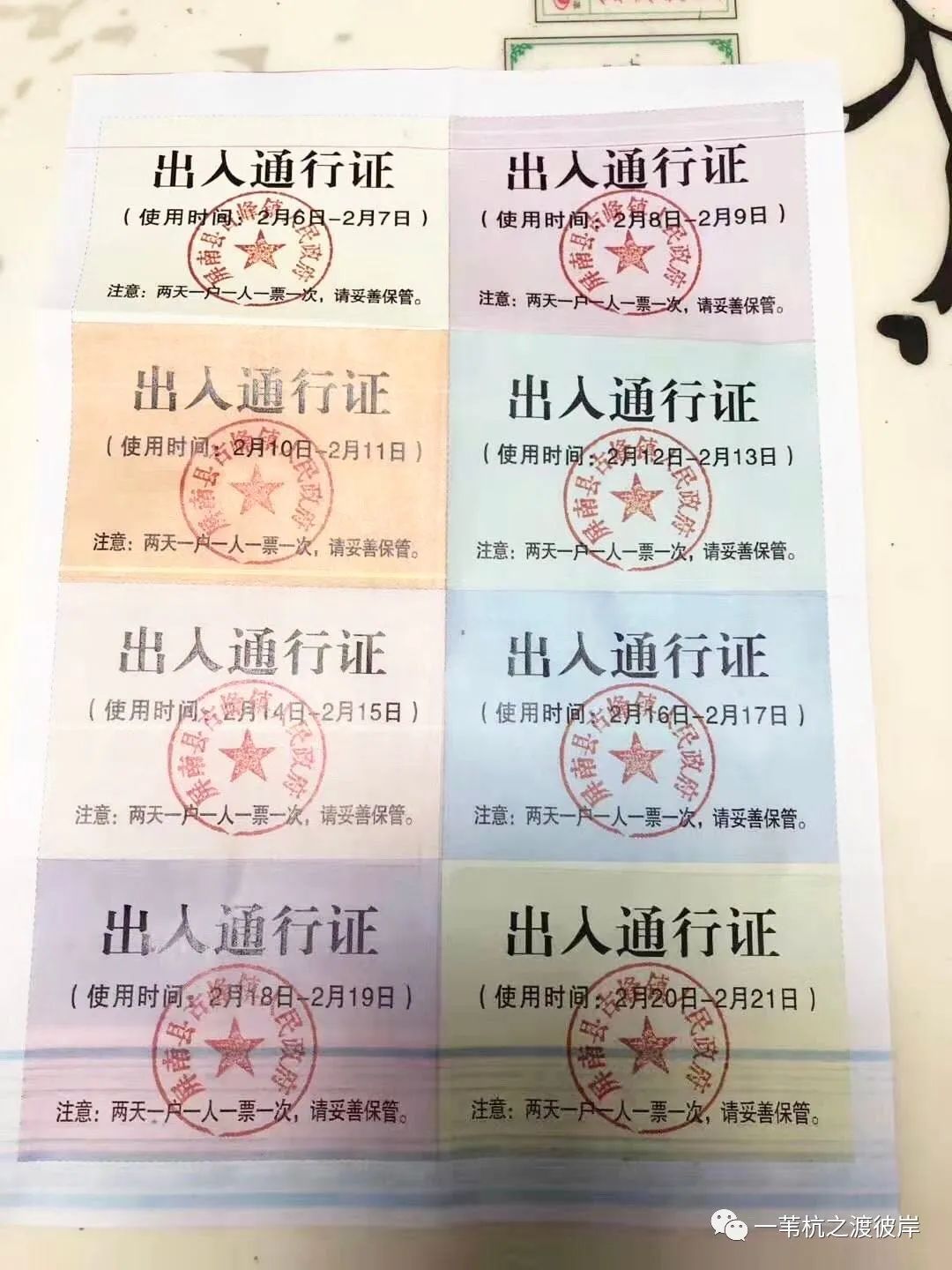
通行证(Walking Permit)。
The first day I could, I went outside to take pictures and go to the supermarket. As I was crossing the street, two volunteers with red arm bands asked me to show the permit. When I showed it to them, they wrote the time and date on it so it could not be re-used. In the following days, I used the permits to take pictures and buy food. I tried my best to record this historic event.
Streets were empty. Except for supermarkets and pharmacies, all stores were closed. It looked like a war had just taken place. Signs posted at pharmacies said “no masks.”
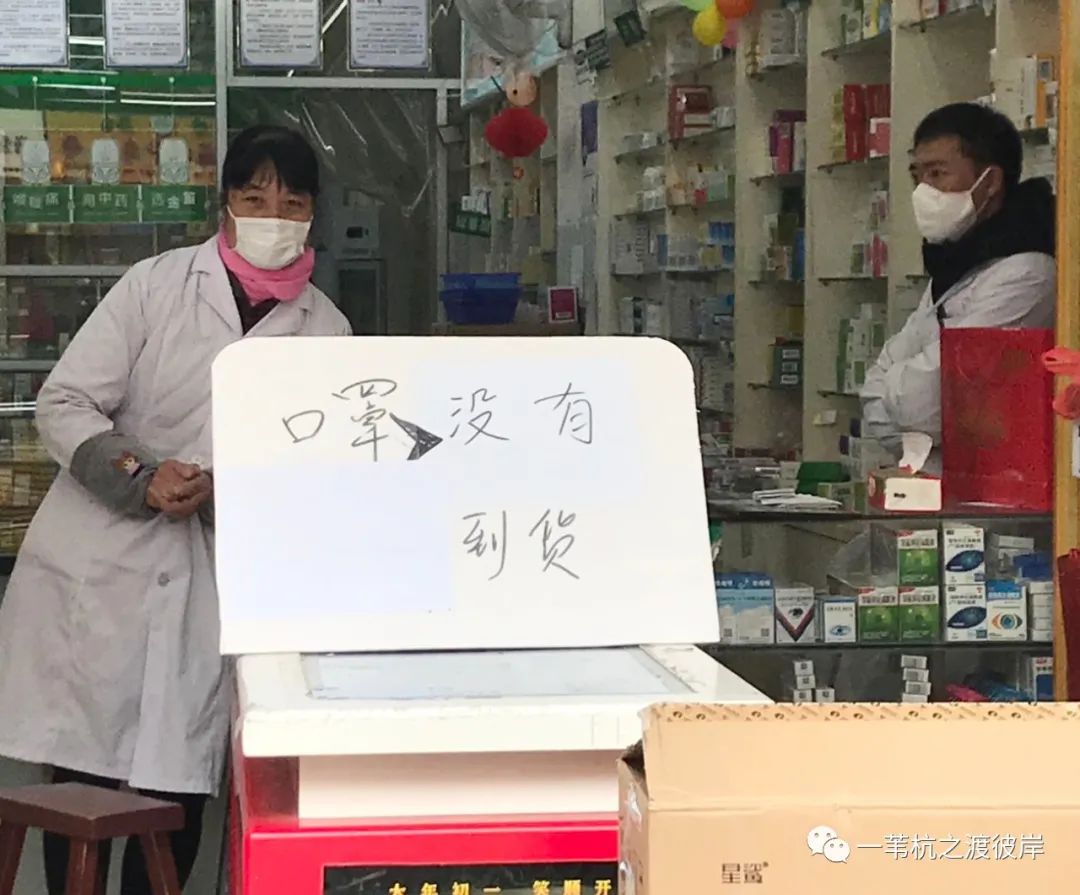
口罩售罄(No Mask)
We did not have masks in the beginning, and I asked for help on my social media, WeChat. Many friends, even from as far away as America, mailed masks to me. One friend in New Jersey bought more than 100 N95 masks and sent them to my house. That gift was so precious that I kept it for long time. When I came back from China in March, I donated it to the hospital in Livingston.
On February 7, the local government announced that there were four suspected cases in my town, creating a dark cloud over this small city. People rushed to purchase rice. I saw a photo of an old man lying on three bags of rice, yelling, “It is mine, don’t touch it.”
That is when my dad said firmly, “Let’s go to buy rice.” My brother and I looked at each other. I said, “If we could not buy the basic goods such as rice, that means society will collapse, it is meaningless to store rice.” But Dad was remembering the great famine of the 1960s, when, he said, “People relied on themselves, rather than the government.” He and my brother drove to the supermarket.
One hour later, they carried in four bags of rice and put them in a corner. “The price was rising, we are lucky to buy four bags,” Dad said with satisfaction. We did not finish the rice until I went back to America two months later.
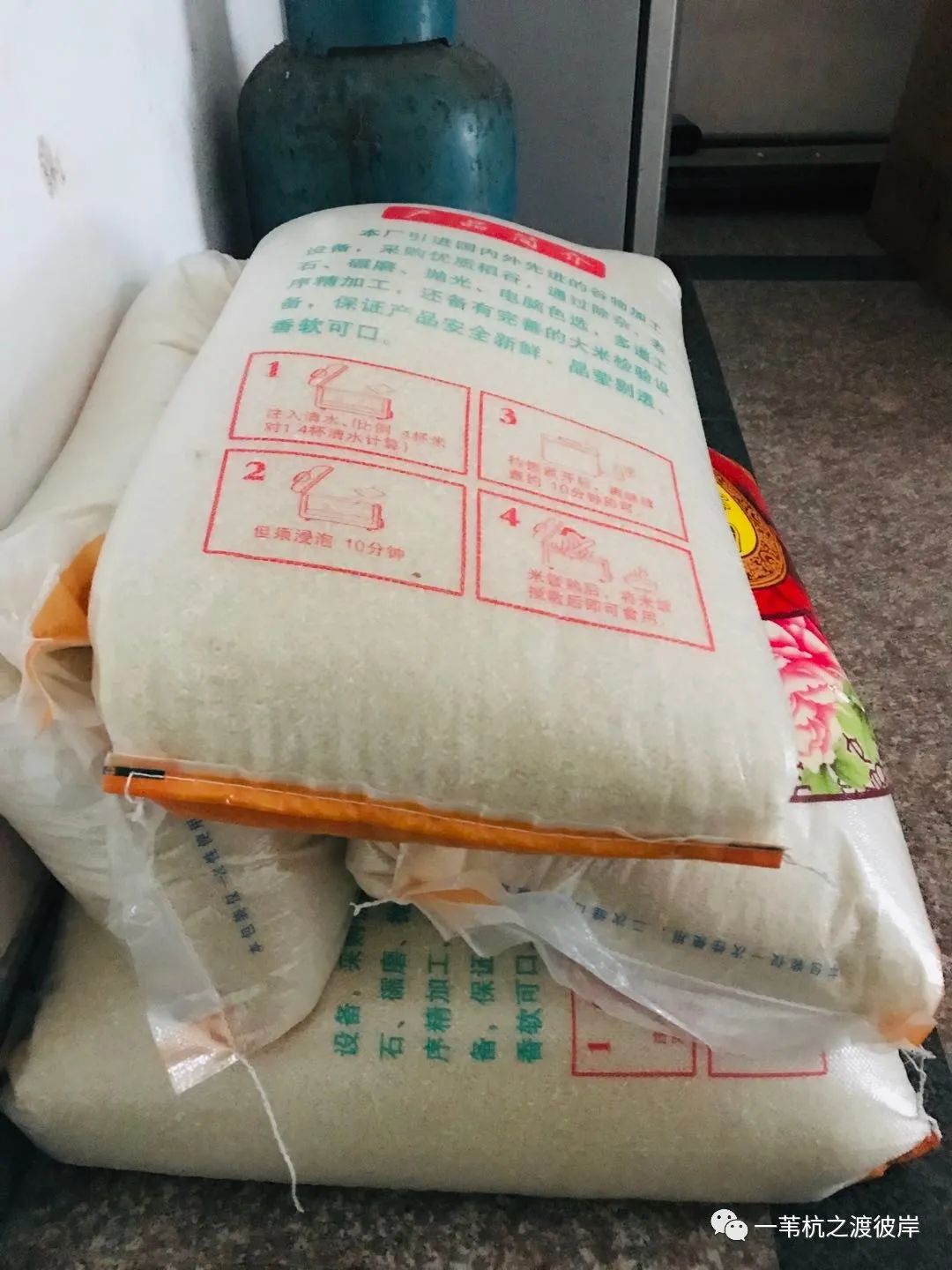
大米(Rice)。
During my stay in China, I had trouble concentrating. I read two books, watched three movies, and edited a book I had planned to publish this year, but it was about America and I could not get a permit to publish it. My other book was delayed for the same reason. Compared to the comparatively relaxed social environment ten years ago, I felt frustrated with current China.
5. Coming Home
I had originally planned to return to America on February 19, but Trump announced, on January 31, a plan to bar Chinese airplanes from China and to cancel a lot of flights between the two countries. An American friend who was visiting her dad in Shanghai suggested I go back as soon as possible, or risk staying in China for a long time. She in fact left the next day.
When I looked at my mom, however, I canceled my return ticket. I knew there was a narrow road back to America, but how could I say good by to my mom?
In the following weeks, I seldom thought about going back. If God had given me a chance to stay with my mom, why not accept it with joy?
The suspected cases of the virus proved to be negative, and the city returned to normal. If it was sunny, Mom and I would go to the garden filled with growing vegetables. She would sit on a stone and tell stories about my hometown and family. It would be good if time stood still now.
A Livingston friend told me she met my daughter in church. When my daughter was asked if she misses her mom, she said yes with tears. Heartbroken, I booked a ticket that night for a flight to America on March 10.
The first COVID-19 case in New Jersey was March 4. In the following days, I saw the number rising. I heard from my husband that they can’t buy masks in America, so I went to the pharmacy to buy 2,000 masks as well as some Chinese herbs. But, at the last minute, my plane was canceled. I had to postpone my flight home to March 21.
The day I was to leave, Mom got her second radiation treatment at the hospital. She told me, “You took care of me for such a longtime, I am happy with it. Take it easy and go back.”
Sadness caught my throat, and I could not say anything. I took my luggage outside. Mom put an orange in my hand. “Take and eat it on the road.” We could not look at each other. I was afraid that the damof grief would collapse.
I bid farewell to Dad and headed for the airport. With mask, gloves and glasses, I checked in. The airport was empty, like a cornfieldafter the harvest. There were only 10 passengers on my flight to America, all of us silent.
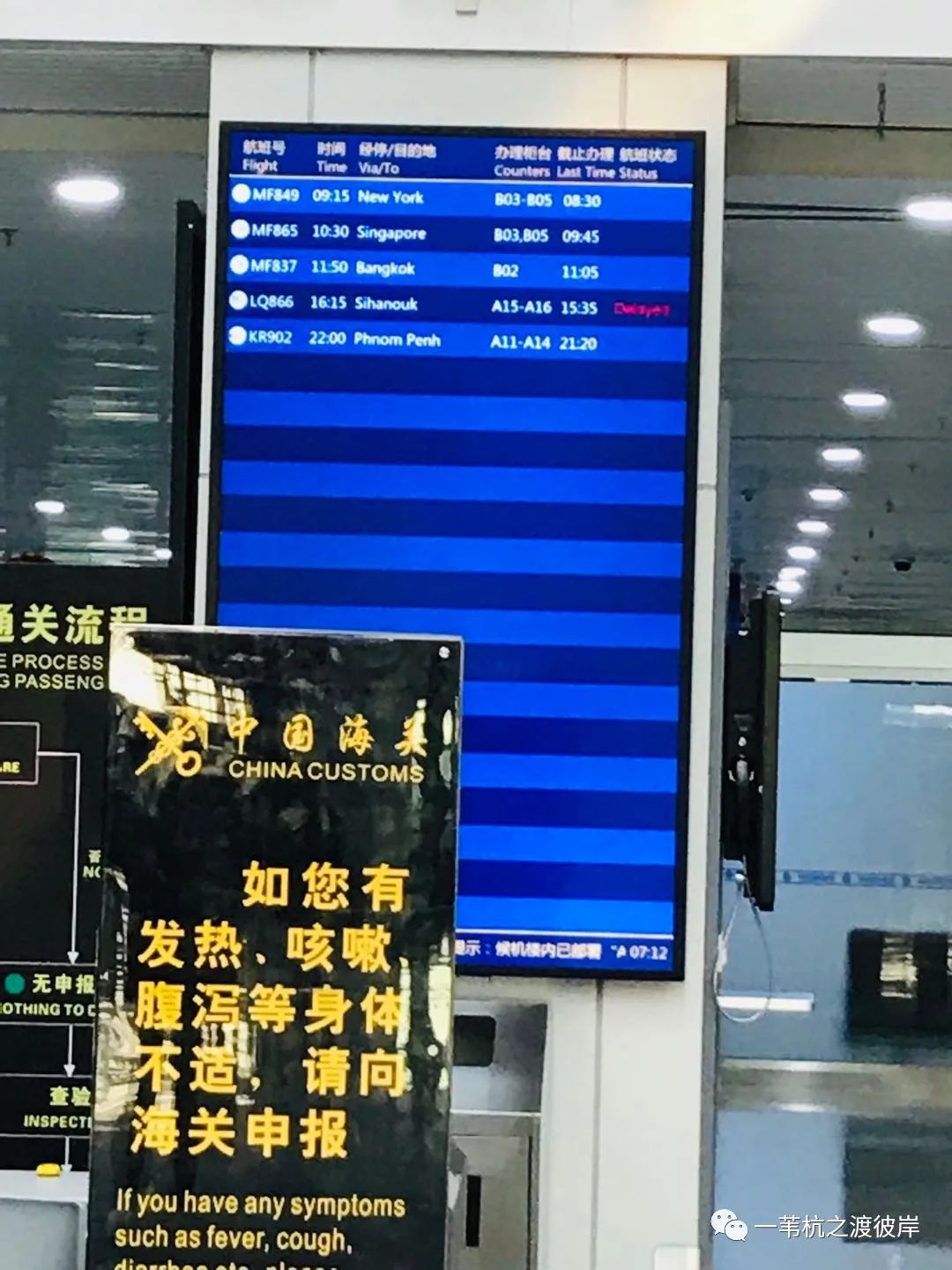
福州长乐机场(Airport)
After filling out forms and having my temperature taken, I headed for the boarding gate. The only open store was a mini supermarket, where I bought bread and a bottle of water.
In the departure lounge, passengers sat separately, far from each other. On the plane, the flight attendants’ smiles were covered by masks. Everyone, it seemed, had heavy hearts.
After 14 hours, we plane landed at JFK Airport in New York City. When we exited the plane, there were two workers with masks waiting for us. One said “Welcome back, follow me please.” She guided us to a room and took our temperatures. Luckily, everyone was normal. Then we went to the arrival lobby, which was empty.
My husband picked me up. With a mask and sunglasses,he looked strange. He took out a bottle with alcohol and sprinkled me. “Oh, my God, I am not a tree or flower, I am your wife!” I shouted at him.
On the road to our house, I saw that spring was coming. Two months had passed. The rhododendron was blooming and cherry tree blossoms were dancing in the wind.
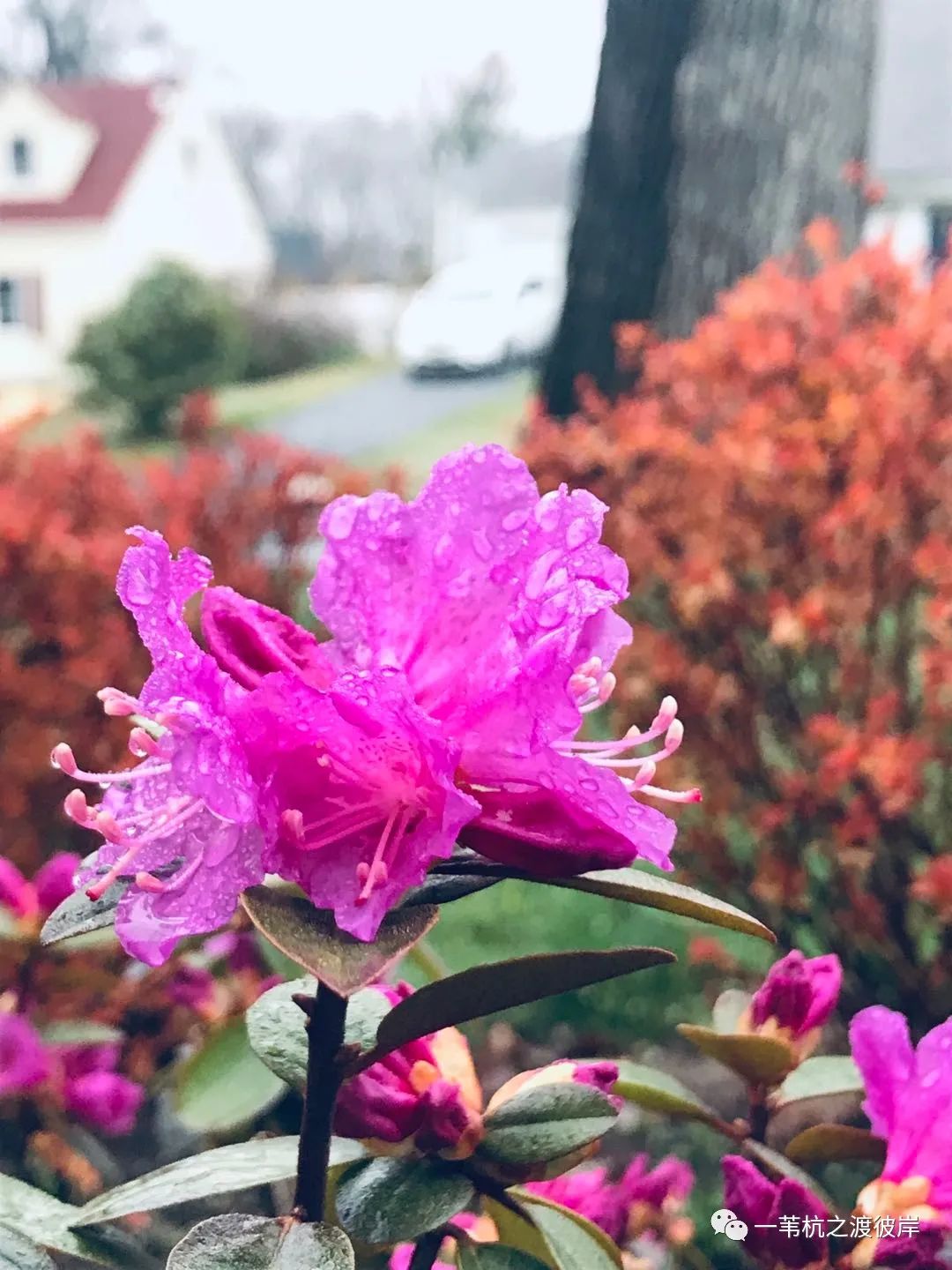
门前花开(Blooming Flower)
When my daughter opened the door, she looked taller than I had last seen her. I wanted to hug her but could not because of social distancing.
That day, the number of cases of Covid-19 in Livingston was more than 100. I heard that the doctors and nurses at the hospital needed PPE, so I reached out to people on my social media to donate. Soon I raised almost $5,000 and bought about 3,000 N95 and medical masks from China to donate.
Everyone around the world is related to each other, nobody is a lonely island.
2020 is a watershed year in human history. After a long era of economic prosperity, we have to learn how to go ahead in the uncertain future.
——End——
【作者简介】:林世钰,媒体人,作家。曾出版《美国岁月:华裔移民口述实录》《烟雨任平生:高耀洁晚年口述》《美丽与哀愁:一个中国媒体人眼中的美国日常》《潮平两岸阔:15位中国留美学生口述实录》等书籍。其中《烟雨任平生》被香港“亚洲周刊”评为“2019年度十大中文好书(非虚构类)”。喜欢旅行、摄影、收集民间手工艺品。目前旅居美国新泽西州。


